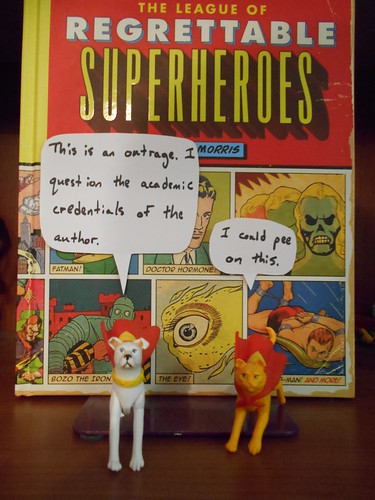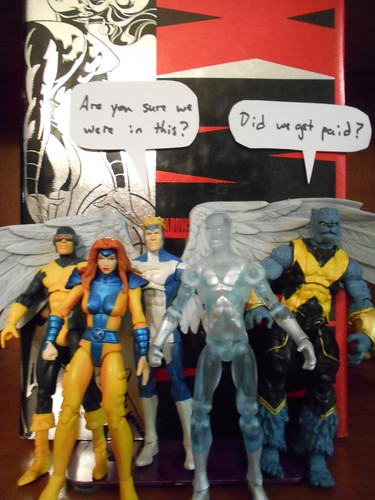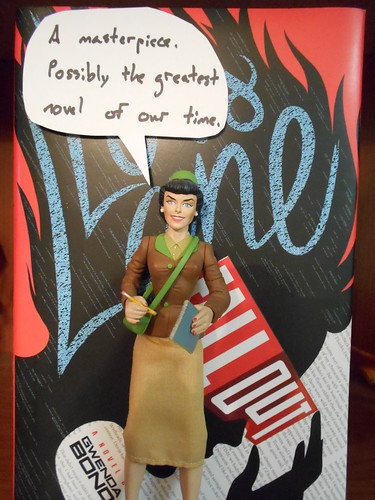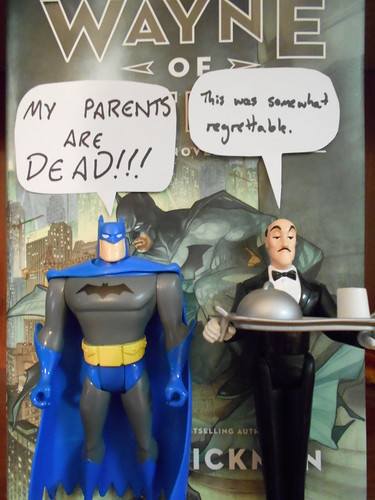There are actually enough to last two months. Maybe three.
I have enough books waiting to be read that I can now sort them into categories.
This is not good. I have books stacked all over my living room, mostly on or under the end tables, but now there is a stack next to the coffee table, too, because the coffee table is full. In light of that, I'm going to make a promise to myself: I will not purchase any new books until I have removed at least 25 books from the apartment. Not read 25 books, but remove, because some of them are books that I will read and keep.
With that in mind, let's go ahead and look at what I read in June.
1) Marilyn Johnson's Lives in Ruins introduces us to the unglamorous world of practicing archeologists. While the public thinks of them as Indiana Jones types, digging up gold and stomping through jungles, most of them live close to the poverty line, struggling from grant to grant as they work to preserve history that is often unappreciated and unfunded. Despite the slightly depressing state of most of the people profiled, Johnson still manages to keep the story light, optimistic, and focused on the benefits of preserving our cultural heritage and the struggles of the people who fight to do so.
In an interesting side note, one of the later chapters featured a doctor working on Fort Drum, the army base my parents retired out of and which is a few miles from my house. I called my mom to ask if she knew the doctor, and it turns out that my mom actually volunteered on an excavation with her a few years ago and offered to introduce us next time I go home.
That book was a leftover from May's month of all nonfiction, and once I finished it, I moved on to the books about comics.
2) Jon Morris' The League of Regrettable Superheroes was an interesting look at some of the weirder characters through comic book publishing history. It includes many illustrations, and also outlines both the characters' fictitious histories and their publishing ones. There were only a few places where I disagreed (for example, he describes one character's ability to split off his limbs and beat people with them as unique, ignoring that rejected Legion of Superheroes applicant Arm-Fall-Off Boy also has appeared numerous times with the same power), but for the most part this was entertaining and informative.
The book was also pretty brutal toward the Legion of Super Pets, too. I get that they're a little dorky, and definitely one of the more hilarious parts of the silver age, but almost every comic company had at least one animal sidekick appearing regularly, so singling out the Super Pets (who haven't been published in decades) while ignoring the fact that Marvel is still publishing adventures of the Pet Avengers is a little unfair.
Don't just take my word for it, though. Let's see what Krypto and Streaky (or maybe Whizzy), founding members of the Legion of Superpets, thought:

That's that, I guess.
3) You know that feeling you get when you realize that a book is taking on so much that there's not going to be a way to tie the plot up in the number of pages that are left? That happened to me while reading Lexie Dunne's Superheroes Anonymous, so I was already prepared for it to jerk to a stop mid-plot with "To Be Continued" but I was also annoyed that the paperback copy doesn't have a "Book One" or "One of Two" on it anywhere. If it did, I might have bought them both together and been able to fully evaluate the story, but since it didn't, I feel like I'm judging half of a book.
In the first part of the story, we are introduced to Gail Godwin, nicknamed Hostage Girl by the press because she tends to get kidnapped by supervillains, over and over, and always rescued by the Blaze, who might also secretly be her boyfriend, Jeremy. When Jeremy and the Blaze both move to Miami in the same week, leaving Gail behind in Chicago, no one tells the evil Dr. Mobius, who kidnaps her and injects her with chemicals, intending to blackmail the Blaze for the antidote. The Blaze never arrives, though, and the chemicals transform Gail into something else, something superpowered. Whisked away into a world of capes and costumes, Hostage Girl struggles to understand her new powers and to find a way to keep the cancer that they've given her from killing her, and also to learn the truth about Jeremy and the Blaze, and also to understand why Dr. Mobius kidnapped her in the first place, but... oops, To Be Continued. This was sort of interesting, and if I had the second book on hand I might have started reading immediately, but this seemed kind of run of the mill, and not worth the effort of even downloading the sequel to my kindle. I didn't find myself really liking or caring about any of the characters enough to wonder what happens to them.
4) Speaking of run of the mill, Michael Jan Friedman's X-Men: Shadows of the Past was a pretty standard X-Men novel. The most interesting thing is that the book, published in 2000, has a page at the back inviting the reader to try out something new and exciting called an "I-book", which is the future of the publishing industry.
I hope those catch on.
Original X-Men, do you have anything to add?

Yeah, you actually were in this. I'm not sure why. It could have been a book about anybody.
5) Gwenda Bond's Lois Lane: Fallout at least tries to imagine a new setting for the familiar characters of Lois Lane and Clark Kent, placing Lois in high school in the modern era, with an online pen pal that she's never met named "Smallville Guy". Determined to make a fresh start and permanent home at Metropolis High, Army brat Lois finds herself immediately recruited for a student newspaper and trying to help a former star student who is being bullied by the Warheads, a group of gamers who seem unstoppable both in the real world and in "Worlds War Three", the online multiplayer game that so many of Lois' new friends are playing. Is the girl just imagining the weird power the Warheads seem to have over her mind, or is there something more sinister about the weird school internship, Project Hydra, all of the Warheads are involved in? Will Lois be able to get to the bottom of the story, and if she does, will she be able to suffer the consequences?
This sounds like someone decided to write a Young Adult novel with every youthful buzzword they could find ("Video games! And bullying! And Lois and Clark can flirt over text messages! And insta-photos!") but Bond actually manages to craft a decent story with realistic characters who mostly act like real high school students.
Lois?

Thanks for the unbiased review. I wouldn't go quite that far, but I enjoyed it. That's more than I can say for the next book:
6) I'm not sure I can explain all the things that are wrong with Tracy Hickman's Wayne of Gotham, but I feel like just saying, "It's terrible" isn't really enough. After reading it, I'm wondering if Hickman has ever read a Batman comic book, because she never seems to actually get the characters, and instead presents a relationship where Batman resents and is distrustful of Alfred and where Alfred outright lies to Batman throughout the novel.
As bad as that is, though, the real problem is that this story of Batman uncovering a dark secret in his father's past doesn't really need to be told. Thomas and Martha Wayne, like Jor-El and Lara or Richard and Mary Parker, are props. They aren't intended to be interesting, stand alone people with hopes and fears and dreams. They are footnotes in the origin stories of the main character, and attempts to make them main characters of their own almost always turn out awkward and somewhat forced.
Batman? Alfred? Anything to add?

Yeah.
I finished out the month by moving away from comics for a minute:
7) Christina Henriquez' The Book of Unknown Americans is this year's freshman class "Life of the Mind" book, so I figured I would knock it out now rather than rush to finish it by August. The story of the Rivera family and their neighbors, it's realistic, but also sad, outlining their journey from Mexico to Delaware seeking medical care and therapy for their daughter, Maribel, after a terrible accident. Struggling to learn the language and adapt to their new home, they find themselves isolated, marginalized, and eventually horribly victimized.
I think the freshmen will get a lot out of this, and it will expose them to experiences that many of them have never had or spoken to anyone about, but why does every book where we expect them to learn something have to be depressing?
I'm going to keep trying to get onto the committee that selects those books, because there are good books with good messages that won't make you want to go lay down in a dark room and sob quietly.
In the meantime, I have a ton of books to read.
1 comment:
Hey Joel, since you love reading and love reviewing, I wanted to ask if you've ever heard of a website called "GoodReads". Basically, you sign up for free (just make up a user name and password and throw in an email address). They have a massive database of books (truly massive), and you look up the titles of books you've already read, and rate them. The website stores and displays all your ratings and reviews, and the best part is that it uses the information about the books you've read and the ratings you've entered to suggest new books that you might like to read. When I first heard about it, I was sort of "meh"... but I went ahead and tried it, and I can't believe the number of fabulous books I've read since then - books that I never would have heard of if it hadn't been for that website!
The initial period of entering ratings for books you've already read takes a while, but after that initial loading in of information it's a breeze. When you find books that you'd like to read, you just tag them "want to read" and it keeps them on file for you. This is helpful to me (I have about 70 books in my "want to read" list) because my library sometimes doesn't have books I'm looking for, so they stay on the list until I can locate them or the library orders them.
When you've read a book, you rate it and put in the date you finished reading it, and it keeps that on file as well. Before you know it, you've racked up a whole library of books you've read. I have a terrible memory when it comes to most books (I enjoy reading them but then immediately forget all about them) so being able to go to my GoodReads site and browse the books I've read is helpful and enjoyable. Before reading a book, you can read other people's reviews and it gives you a better idea of whether you want to read it or not.
Another cool feature is that if you have friends who are also on GoodReads, you can add them to your account, and see what they're reading. If you read a book you think they'd like you can suggest it to them, or take ideas from their reading list. I don't use this feature much (I only have two or three people tagged - my husband and a couple of friends from work) but it's neat, anyway.
The website is really user friendly and easy to work with. Just thought you might like to check it out.
www.goodreads.com
Post a Comment